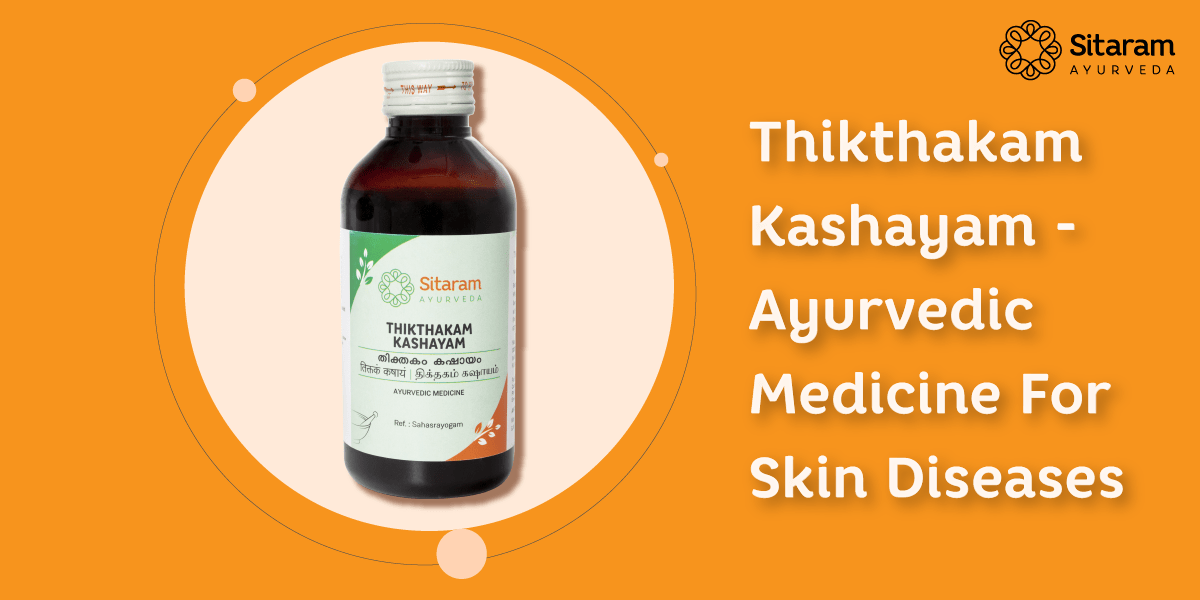Thikthakam Kashayam – Ayurvedic Medicine For Skin Diseases

Why is Skin Health important?
Skin health is essential for your good appearance. But above that, skin health is more critical because skin performs many tasks in our body. People care so much for their skin that the cosmetic industry has become one of today’s leading industries. Skin problems cause equal if not more psychological issues than physical suffering.
Skin conditions range from a harmless rash to the most severe diseases like skin cancers. Moreover, factors like age, geography, climate, ethnicity, etc., influence the texture and tone of the skin. Hence the presentations of skin diseases vary considerably worldwide.
Structure of the Skin
The skin has three layers, namely the epidermis, the dermis, and the subcutaneous tissue.
- The epidermis is the outermost layer. From the epidermis, the dead cells shed continuously, and the new ones formed. Thus our skin is constantly being regenerated.
- The dermis includes sweat glands, hair follicles and sebaceous glands.
- The subcutaneous layer is made up of connective tissue and fat.
Common skin problems
- Acne
- Eczema
- Urticaria
- Sunburn
- Contact dermatitis
Acne
Acne occurs when hair follicles become plugged with oil and dead skin cells.
Symptoms
- Whiteheads
- Blackheads
- Pimples.
- Painful pus-filled lumps
Eczema
Atopic dermatitis or eczema is a condition in which patches of the skin become red and itchy.
Atopic dermatitis is a chronic disease.
Symptoms
- Dry skin
- Severe itching
- Red to brownish-grey patches over the skin
- Thickened, cracked, scaly skin
- Fluid-filled vesicles
Urticaria (Hives)
Hives are red, itchy welts on skin triggered by many substances or situations. Chronic hives interfere with our daily activities.
Signs and symptoms of chronic hives are
- Batches of red welts over the skin
- Welts appear and fade repeatedly
- Itching
- Painful swelling of the lips, eyelids and throat
Sunburn
Sunburn is red, painful skin. The skin feels hot to the touch. Sunburn usually occurs within a few hours after too much exposure to UV light from sun/ artificial sources.
Signs and symptoms
- Change in the skin tone
- Skin that feels warm or hot to touch
- Pain
- Swelling
- Small, fluid-filled blisters
Allergic contact dermatitis/ Skin allergy
Red, itchy rash caused by direct contact with a substance or an allergic reaction to it is allergic contact dermatitis. Soaps, cosmetics, fragrances, jewelry, and plants are the most of allergens.
Signs and symptoms
- Red rash
- Dry, cracked, scaly skin
- Itching
- Swelling
- Burning sensation
Psoriasis
In psoriasis, skin cells multiply ten times faster than usual. This build-up of cells causes scaling on the skin surfaces. Typical scales are whitish-silver and develop in thick red patches.
Thikthakam Kashayam
The formulation, Thikthakam Kashayam, is an innovative preparation using drugs of Thikthakam Ghrutham (medicated ghee) explained in the Ayurveda classical text Ashtangahrudaya. The drugs of the above Ghrutham made into a decoction.
Primary ingredients of Thikthakam Kashayam
Patola (Trichosanthes dioica): Plant shows antiallergic, antidiabetic, hepatoprotective, cholesterol-lowering, anti-microbial, anti-inflammatory activities.
Nimba (Azadirachta indica): Nimba (Neem) shows antifungal, antiviral, antibacterial properties. In addition, it is antioxidant, antidiabetic, and anti-inflammatory. Moreover, Nimba is a neuroprotective, immunomodulatory, hepatoprotective, and wound healing drug.
Katuka (Picrorhiza kurroa): The plant shows antidiabetic, hepatoprotective, lipid-lowering, anti-inflammatory, anti-asthmatic activities.
Daruharidra (Berberis aristata)
It is an excellent anti-inflammatory drug. It is suitable for the skin.
Pata (Cyclea peltata)
The plant shows nephroprotective, hepatoprotective, antibacterial, anti-ulcer properties.
Parpatakam (Fumaria indica)
The plant shows the hepatoprotective effect, spasmogenic and spasmolytic effect, anti-inflammatory, anti-nociceptive effect.
Duralabha (Tragia involucrata)
The plant shows antibacterial and wound healing effects.
Thrayamanam (Bacopa monnieri)
The plant shows memory enhancing, tranquilizing, sedative, antidepressant, anticancer, analgesic, and hepatoprotective effects.
Musta (Cyperus rotundus)
Phytochemical and pharmacological studies reveal that Musta has antiandrogenic, antibacterial, hepatoprotective, cardioprotective, antioxidant, anticonvulsant, etc.
Chandana (Santalum album)
Chandana has many properties like antiallergic, antiviral, antibacterial, antifungal, antioxidant, blood purifier, analgesic, antipyretic, etc. It has a cooling effect too.
Kana(Piper longum)
It shows antipyretic, analgesic, digestive, and anti-inflammatory properties.
Thikthakam Kashayam and skin diseases
- Thikthakam Kashayam is very effective in skin diseases.
- The formulation contains many skin protective drugs. It is effective in skin allergies, urticaria, contact dermatitis, eczema.
- The formulation helps reduce itching.
- Thikthakam Kashayam is widely used in acne and reduces scar formation.
- Intake of Kashayam helps to keep the skin clear and glow.
- Thikthakam Kashayam is effective in discolouration of the skin.
- The formulation is highly effective in psoriasis.
Other benefits of Thikthakam Kashayam
- Effective in non-healing wounds, ulcers and abscesses.
- It helps to regulate digestion
- Effective in excessive thirst
- Helps to heal sinus
- Psychological disorders
- Cardio-protective
- Liver disorders
- Effective in leucorrhoea
- Bleeding disorders
Available forms
Thikthakam Kashayam is available in three forms
- Thikthakam Kashaya Choornam (Powder -form)
- Thikthakam Kashaya Gulika (Tablet -form)
- Thikthakam Kashayam (Prepared decoction)
Dose
Kashaya Choornam
Adults- Boil 50 gm of powder in 400 ml of water and reduce to 200 ml. Take 100 ml twice daily.
Children- 50 ml twice daily
Tablets
Adults- one to two tablets twice daily
Children- 1/2 tablet twice daily
Kashayam
Adults can take 15ml Kashayam mixed with 30 ml lukewarm water
Children can take 5 ml Kashayam mixed with 10 ml lukewarm water
Ideal for taking before food.
Side effects
No side effects for Thikthakam Kashayam noted to date. However, it is better to avoid during pregnancy.
One should take medicine under strict medical supervision.
To Buy Thikthakam Kashayam from Sitaram Ayurveda:


 Sign In
Sign In Cart
Cart
Suffering from atopic dermatitis.suggest medicines
Hi
We recommend you to take an online consultation and then move to purchase the products.
For an online consultation please visit : https://www.sitaramayurveda.com/product/doctor-consultation/